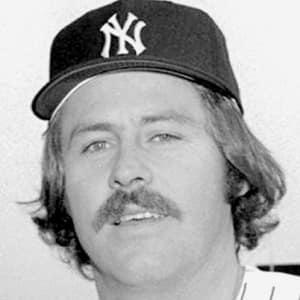
Catfish Hunter
Baseball Hall of Famer Catfish Hunter was a star pitcher for the championship clubs of the Oakland A’s and the New York Yankees in the 1970s.
Synopsis
Born in 1946 in North Carolina, James Augustus "Catfish" Hunter learned to play baseball on his family farm. A star pitcher for the championship clubs of the Oakland
A's and the New York Yankees in the 1970s, he twice led the league in victories and won the 1974 AL Cy Young Award. Elected to the Hall of Fame in 1987, Hunter died in
1999 from complications of amyotrophic lateral sclerosis.
Early Life
Hall of Fame baseball pitcher Catfish Hunter was born James Augustus Hunter, on April 8, 1946, on a farm in Hertford, North Carolina. Hunter claimed that he learned to pitch from his
three older brothers, and developed his famous control by throwing baseballs through a hole in the barn door. After starring in baseball and football at Perquimans
County High School, he signed with the Kansas City Athletics in 1965.
Catfish Nickname
Deciding that the young pitcher needed a catchy nickname, A's owner Charles O. Finley settled on "Catfish" and concocted a backstory: One day the farm boy ran away
from home, and was eventually discovered with two catfish he had caught. To family and friends in his hometown, Hunter had been known only as "Jimmy," but the nickname "Catfish" stuck throughout his professional career.
Baseball Career
Without throwing a pitch in the minor leagues, Hunter joined the A's in 1965. He went 55-64 over his first five seasons, although he was named an All-Star in 1966 and
1967. On May 8, 1968, after the A's had moved to Oakland, Hunter threw the first regular-season perfect game in the American League since 1922.
Although he was never a power pitcher, Hunter learned to master his craft as the A's developed into a fearsome juggernaut. He won 21 games in 1971, the first of five
consecutive seasons with at least that many victories. He added another 21 wins in 1972, to go with a career-best 2.04 ERA, helping the A's collect the first of three
straight World Series championships. In 1974, he topped the league with 25 wins and a 2.49 ERA to claim the AL Cy Young Award.
At the end of that season, Hunter discovered a clause in his contract that had not been honored by the A's, and in arbitration, Hunter won free agency, a status that
was essentially unheard of at the time. His availability started a bidding war among all but one of the 24 Major League teams. He ultimately chose to sign with the
New York Yankees, who offered him $3.35 million for five years, including a $1 million signing bonus, along with other annuities. It was the largest package in
baseball history at the time, and its impact is still felt by players today.
In his first year with the Yankees, 1975, Hunter led the AL with 23 wins and 328 innings pitched. Although his numbers weren't as strong in the following years, he
played a valuable role on the Yankees' World Series teams of 1977 and 1978. Yankees owner George Steinbrenner credited Hunter with teaching the team a winning spirit.
In 1976, Hunter became just the fourth pitcher since 1900 to win 200 games before his 31st birthday. However, arm problems and the onset of diabetes soon curbed his
effectiveness, and he retired after the 1979 season at the age of 33. An eight-time All-Star, Hunter compiled a career record of 224 wins and 166 losses, to go with a
3.26 ERA. He was inducted into the Baseball Hall of Fame in 1987.
After Hunter retired he returned to his farm in Hertford, where he resumed a simple life of fishing and hunting. In 1998, he was diagnosed with amyotrophic
lateral sclerosis, also known as Lou Gehrig's disease, which claimed his life a year later. Hunter was 53 years old. He was survived by his high school sweetheart, Helen, and three children,
Todd, Kimberly and Paul.



